Our Health Library information does not replace the advice of a doctor. Please be advised that this information is made available to assist our patients to learn more about their health. Our providers may not see and/or treat all topics found herein.
Topic Contents
Caregiving: Using Disposable Gloves
Overview
Disposable gloves are gloves that you use one time and then throw away. They can protect your health and the health of the person you're caring for. They help keep germs and infection from spreading to you and to the other person.
Use gloves whenever you might touch body fluids, such as saliva, blood, urine, or stool. Use a new pair of gloves when you touch areas near a cut (incision) made by a doctor. And some people use gloves when bathing someone. Gloves can also be used when you put medicines on the skin and when you give shots.
Gloves do not protect you from poking your skin with sharp objects. So if you are handling sharp objects, such as needles, be sure that the object doesn't poke a hole in the glove. Handle these types of objects carefully.
Gloves can help prevent infection from body fluids. But if there are times when you choose not to use gloves or don't have any, keep your hands as clean as possible. After coming into contact with body fluids, wash your hands as soon as you can. And keep hand sanitizer available.
Types of disposable gloves
Disposable gloves may be sterile or non-sterile. Your care team can tell you if you need to use sterile gloves, and they will give you special instructions about where to get them and how to use them. Most people do not need sterile gloves. Sterile gloves will be individually wrapped. Non-sterile disposable gloves are usually pulled out of a box or container.
Disposable gloves may be made from latex (rubber) or vinyl. If you or the person you're caring for is allergic to latex, be sure to use non-latex gloves.
Putting on disposable gloves
Be sure the gloves are the right size. They should fit close but should not be too tight. If the gloves are too big, they can slip or make it harder to grip things. If they're too small, they won't feel comfortable and they can tear.
- Wash your hands well with soap, and rinse them with clean, running water. Then dry them well.
- Hold the glove in one hand, and put your other hand into the glove.
- Repeat with your other hand.
Taking off disposable gloves
Use this method to take off disposable gloves, so that any soiled material or germs stay away from your hands.
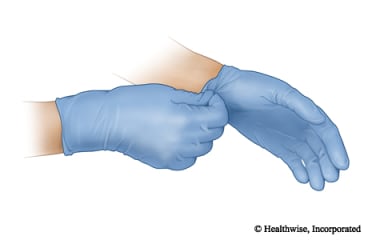
1. Grasp the cuff. Use the hand that you write with to grasp the cuff of the glove on the other hand.
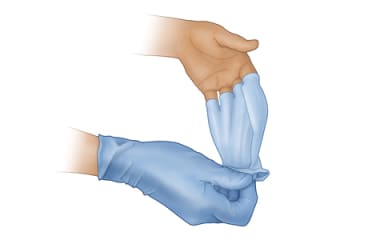
2. Pull that glove off so that it is inside out. Be sure any soiled material stays inside that glove.
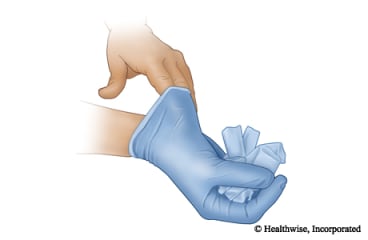
3. Ball up the glove with your covered hand. Then put one or two bare fingers inside the second glove so you can remove it. Make sure that the bare fingers don't touch the outside of the glove.
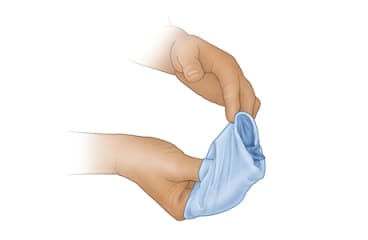
4. Peel off the other glove. Pull down with those fingers, peeling off the other glove. The first glove will be inside the second glove.
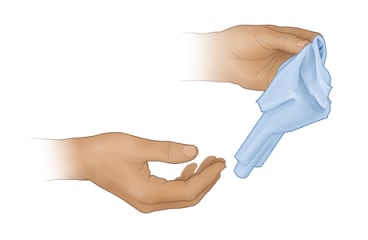
5. Throw away the gloves. Put them in a plastic bag, and wash your hands.
Related Information
Credits
Current as of: December 1, 2025
Author: Ignite Healthwise, LLC Staff
Clinical Review Board
All Ignite Healthwise, LLC education is reviewed by a team that includes physicians, nurses, advanced practitioners, registered dieticians, and other healthcare professionals.
Current as of: December 1, 2025
Author: Ignite Healthwise, LLC Staff
Clinical Review Board
All Ignite Healthwise, LLC education is reviewed by a team that includes physicians, nurses, advanced practitioners, registered dieticians, and other healthcare professionals.
This information does not replace the advice of a doctor. Ignite Healthwise, LLC disclaims any warranty or liability for your use of this information. Your use of this information means that you agree to the Terms of Use and Privacy Policy. Learn how we develop our content.
To learn more about Ignite Healthwise, LLC, visit webmdignite.com.
© 2024-2025 Ignite Healthwise, LLC.



